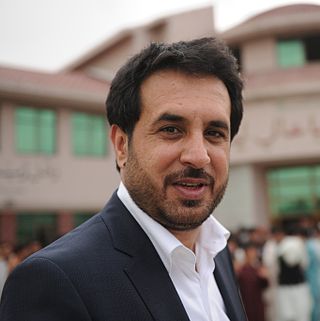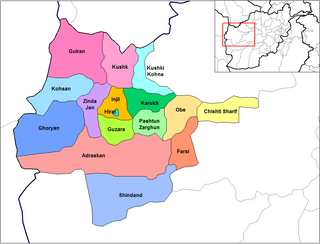
Hamid Karzai is an Afghan politician who served as the fourth president of Afghanistan from July 2002 to September 2014, including as the first elected president of the Islamic Republic of Afghanistan from December 2004 to September 2014. He previously served as Chairman of the Afghan Interim Administration from December 2001 to July 2002. He is the chief (khān) of the Popalzai Durrani tribe of Pashtuns in Kandahar Province.

Gul Agha Sherzai, also known as Mohammad Shafiq, is a politician and former warlord in Afghanistan. He is a former governor of Nangarhar province in eastern Afghanistan. He previously served as Governor of Kandahar province, in the early 1990s and from 2001 until 2003. In October 2013, Sherzai resigned from his post as governor and formally announced himself as a candidate for Afghanistan's 2014 Presidential Election, and served as the minister of border and tribal affairs until the Taliban captured Afghanistan again in 2021.

Khost is one of the 34 provinces of Afghanistan located in the southeastern part of the country. Khost consists of thirteen districts and the city of Khost serves as the capital of the province. Historically, Khost used to be a part of Paktia and a larger region surrounding Khost is still referred to as Loya Paktia.
A jirga is an assembly of leaders that makes decisions by consensus according to Pashtunwali, the Pashtun social code. It is conducted in order to settle disputes among the Pashtuns, but also by members of other ethnic groups who are influenced by them in present-day Afghanistan and Pakistan.

Jan Mohammad Khan was a politician in Afghanistan, who served as Governor of Oruzgan Province from January 2002 to March 2006, member of the National Assembly, and a special adviser to President Hamid Karzai. He was an elder of the Popolzai Pashtun tribe in Oruzgan and a close ally of Hamid Karzai.

Asadullah Khalid is a politician in Afghanistan. He served as head of the National Directorate of Security (NDS), which is the domestic intelligence agency of Afghanistan. Before his appointment as the head of the NDS in September 2012, Khalid served as the Minister of Tribal and Border Affairs. Between 2005 and 2008, he was the Governor of Kandahar Province and prior to that as Governor of Ghazni Province (2002-2005). From 2018 until 2021 he was the Minister of Defense. Khalid is said to be affiliated with the Islamic Dawah Organisation of Afghanistan and has been noted as one of many loyalists of Afghan President Hamid Karzai.
Pacha Khan Zadran is a militia leader and a politician in the southeast of Afghanistan. He was a former anti-Soviet fighter and militia leader who played a role in driving the Taliban from Paktia Province in the 2001 invasion, with American backing. He subsequently assumed the governorship of the province. In 2002, he engaged in a violent conflict with rival tribal leaders in the province over the governorship of the province, shelling Gardez City and obstructing two separate appointed governors sent by Hamid Karzai.
The following lists events that happened during 2002 in Afghanistan.
The following lists events that happened during 2004 in Afghanistan.

The Afghan Interim Administration (AIA), also known as the Afghan Interim Authority, was the first administration of Afghanistan after the fall of the Taliban regime and was the highest authority of the country from 22 December 2001 until 13 July 2002.

Mohammad Gulab Mangal is an Afghan politician. Since October 2016, he has been serving as the senior adviser minister of borders and tribal affairs for the president of the Islamic Republic of Afghanistan. He is also actively involved in the tribal conflict resolutions. On 23 October 2016, he was appointed as the senior adviser for the minister of borders, tribal affairs, and provincial governor of Nangarhar province until he resigned in April 2018. From 22 April 2015 to 23 October 2016, based on the presidential decree, he was appointed as the acting minister of Ministry of Borders and Tribal Affairs. In 2002, he was elected as the Representative of Paktia Province for Emergency Loya Jirga. From 2002 to 2004, he was the Head of Constitution office for the south east region(Paktia, Paktika, Khost and Ghazni provinces and also Head of Constitution Loya Jirga election office for the South East Region. From 2004 to 2006, he served as Governor of Paktika province. From 2006 to 2008, he served as the Governor of Laghman province. From March 2008 to September 2012, he served as provincial governor of Helmand province.
Ibrahim Haqqani is a citizen of Afghanistan, a prominent member of the Zadran tribe, who served with the Taliban, and was later a high level appointee of Hamid Karzai, the President who replaced the Taliban.

The Ministry of Borders and Tribal Affairs, is an organ of the Central Government of Afghanistan.
Amanullah Khan (1892–1960) was the ruler of Afghanistan, 1919–1929.

Amanullah Khan was a citizen of Afghanistan and a tribal leader from Afghanistan's Pashtun ethnic group. He was from Ghurian district in Herat Province.
General Kamal Khan Zadran is a member of a prominent family active in Eastern Afghanistan. In 2001 his brother Pacha Khan Zadran was a signatory of the Bonn Conference agreement that chose Hamid Karzai as the President of the Afghan Transitional Authority. In 2002 his brother Amanullah Zadran, defected from the Taliban and was appointed the Minister of Border Affairs and Tribal Affairs, and Pacha Khan was appointed Governor of Paktia Province.
2003 in Afghanistan. A list of notable incidents in Afghanistan during 2003
The second Karzai cabinet was the cabinet of Afghanistan that led the government from the re-election of president Hamid Karzai in 2009 until the end of his term in 2014. The cabinet consisted of the president, his two vice-presidents, 18 ministers who received approval from the Afghan Parliament, and 7 acting ministers who have not been approved.

The Afghan tribal revolts of 1944–1947 or the Khost disturbances were a series of tribal revolts in the Kingdom of Afghanistan by Zadran, Safi and Mangal tribesmen which lasted from February 1944 to January 1947. The causes of the revolts lay in the worsening conditions of farmers, changes in conscription laws, the elimination of the power of Safi tribal leaders, Amanullah loyalism, trading monopolies, government surveillance, taxation, and poverty. The conflict began when government forces clashed with the forces of a tribal leader named Mazrak, who led the Zadran tribe in revolt. The Zadran uprising was followed by additional uprisings by the Safi and Mangal, the former of which elected their own king, Salemai. Faqir of Ipi, a tribal leader from Waziristan, also fought for the restoration of former king Amanullah Khan alongside other rebels.
Democracy in Afghanistan has been severely limited and characterized by short, unstable historical periods since the formation of the contemporary state of Afghanistan in the 20th century. Following the rise of power of Ghazi Amanullah Khan in 1919, the first elements of a democratic government in the country began to emerge, with the formation of a constitution and increased civil liberties. Amanullah's political reforms resulted in his overthrow and for much of the rest of the 20th century, until 1964, there was limited democratization in the country. With the establishment of a bicameral national legislature in 1964 by King Zahir Shah, political parties began to form; however, none of these reforms were lasting after Zahir Shah's removal from power in 1973 and the formation of an autocratic Afghanistan republic.









